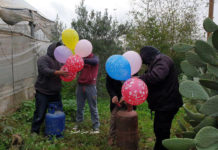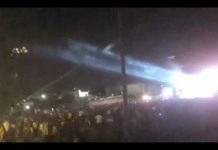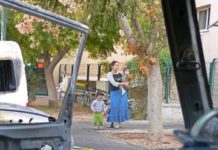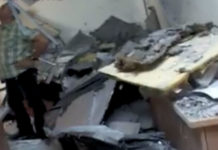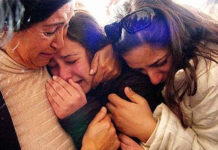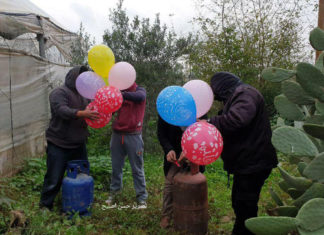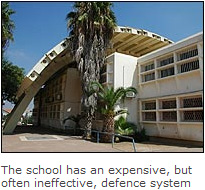
Monday – the second day of the school year – started in terror for the school and a small kindergarten over the road.
At 0800, at the start of the school day, one of the crude unguided rockets smacked into a small cluster of trees metres from the kindergarten.
Three such strikes within 10 minutes seemed precisely designed to catch children on their way to school, rendering the elaborate protective measures useless.
To the Islamic Jihad militants who fired them, the rockets were pay-back against Israel for the deaths of a number children in Israeli air strikes in Gaza in the past week.
To parents in Sderot, the attack was a further outrage and fuel for their struggle to pressure the Israeli government to provide better protection for their children.
Big explosion
There have been at least six deaths in this 22,000-inhabitant town in the last six years from rocket attacks – few compared with the heavy Palestinian casualties the conflict inflicts on Gaza just a kilometre away.
Sderot’s nightmare is of a direct hit on some kind of community building, even a school, that could raise its death toll dramatically.
Even without such an event, the Qassams – as they are generically known – cause panic, disruption and trauma, especially to children.
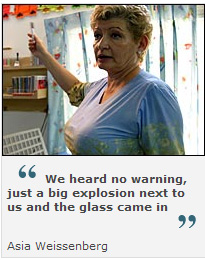
“We heard no warning, just a big explosion next to us and the glass came in,” said music teacher Asia Weissenberg, a Sderot resident for the 17 years since she immigrated to Israel.
Only afterwards could she shepherd the two and three-year-olds past the thick metal door which leads from every classroom into a reinforced shelter.
“They get scared… maybe they’re too young to fully understand, but if we’re calm they are calm,” says Ms Weissenberg. She admits only having lost her composure after seeing “fathers with tears in their eyes” rushing to see if children had been hurt.
Footage at Haroeh school shot by volunteers from a local pressure group, Sderot Media Centre, captures the turmoil of the morning.
They happened to be filming when the siren sounded, and the Hebrew warning “Tzeva Adom” (colour red) repeatedly played over the town’s loudspeakers.
Seconds later the missile lands with a bang, giving schoolchildren hardly any time to duck and scurry to the safety of Haroeh’s shielded buildings.
The camera turns to the cloud of smoke next to the kindergarten, which has no such protection – it is a lucky escape.
Twisted steel
For Batya Katar, head of the local parents association, enough is enough. Her group is calling an indefinite boycott of schools and they plan to take their protest to Jerusalem with a picket of government buildings.
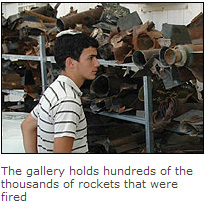
She herself has already moved her 12-year-old son away from the town.
“I don’t care if it takes one year, two years, 10 years, our children must be made safe”.
We met Ms Katar at Sderot police station, where I viewed the “Qassam gallery” – row upon row of the twisted steel pipes which came fizzing over from Gaza.
Each rocket has its date chalked on the side, and some have the manufacturers’ stencilled Arabic epithets like Najm (star) and Quds (Jerusalem).
The overwhelming feeling among Sderot residents – the only civilians in Israel sharing the Palestinian experience of life under siege – seems to be the government has abandoned them to their fate.
Hundreds of homes in poor tenement-style blocks in the town have no proper shelters, and the impression is Palestinian rocket crews are becoming more accurate and using more sophisticated weaponry.
It is hard to see how, given its location, the government can do much to protect Sderot, short of pursuing all-out war with Gaza, or all-out peace.
“It’s a good place to live, but it is not as good as it used to be,” says the stoical Ms Weissenberg.
“However, we have no choice because I can’t sell my apartment and it would be very expensive to buy anywhere else, so I have to stay.”



